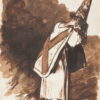Shame on you. Why do we wish shame on others? Shame is not a feeling. It’s a rule, and we try to enforce the rule. It’s not necessarily an official rule, but some cultures border on it being official. Honour is a rule also, but what is seen as honourable differs widely.
To continue on the rule of shame, it serves a purpose. Sort of a parasitic bond, but does shame allow for equal exchange?
Shame lessens one person. It puts one below the other. True. So it’s not even symbiotic. But who benefits from the publicly accepted social rule of shame?
The benefit is not repeating “bad ” behaviour. Yes, but for the one guilty of the bad behaviour, is their life bettered by having been shamed?
Maybe shame benefits someone who wants to control a controller? Yes, shame works two ways or it can’t effectively function. One person has to be “above” shame.
The person shamed has the ability to redeem themselves. Oh, supposedly and redeem themselves to what?
Normalcy. Does normalcy have everyone’s best interests at heart in your experience, my friends?
Actually, we villainize those who are outside of the rule of shame and we lump them all together. But it’s those who acknowledge shame who can be lumped all together. Those who function outside of shame seem to have at least two groupings.
First of those who function outside of shame are the “righteous.” The authors of these rules we live by in the first place, and possessed of the wisdom to function around the rules without damaging them. They sort of depend on them. Though they aren’t perfect in their art, their dark craft is what has formed just about every life shaping institution today. Church, banks, political parties.
Then there are those who live according to a more primal way, and if they influence others it’s more as a role model than power brokering. The “animals”, the “heretics”, artists, etc. The shameless ones, but they are actually seen as villains, non-producers, almost bluntly called parasites. Though some evolve into a role that can influence the old systems, they are by no means a unified body.
Some of the thinkers who are “outside” have got in and have done some damage to a soul crushing system. The heretics aren’t generally welcome when people feel secure in the consensus paradigm. They don’t like you to rock the boat, but heretics live and breath even then.
The heretic shameless will say thank you when told they’re shameless. They are proud of it. Yes, the “destroyers” are quite creative.
The righteous however just don’t agree they are shameless? More like they have internal shame. They do have internal shame, or they would seem insincere, dishonest, and they wouldn’t understand the system of shame well enough to use it on others.
Don’t the righteous place shame on the unrighteous and the heretics? They do, and are afraid of the heretic. They know the heretic is unmoved, or if moved, then moved to a more impassioned defiance and claim that the heretic wants no rule or peace at all. That the heretic would destroy everything. Has this been the case historically?
Your thoughts are welcome. Be well friends.
Travis Saunders
Dragon Intuitive
~science,mysticism,spirituality~



Leave a Reply